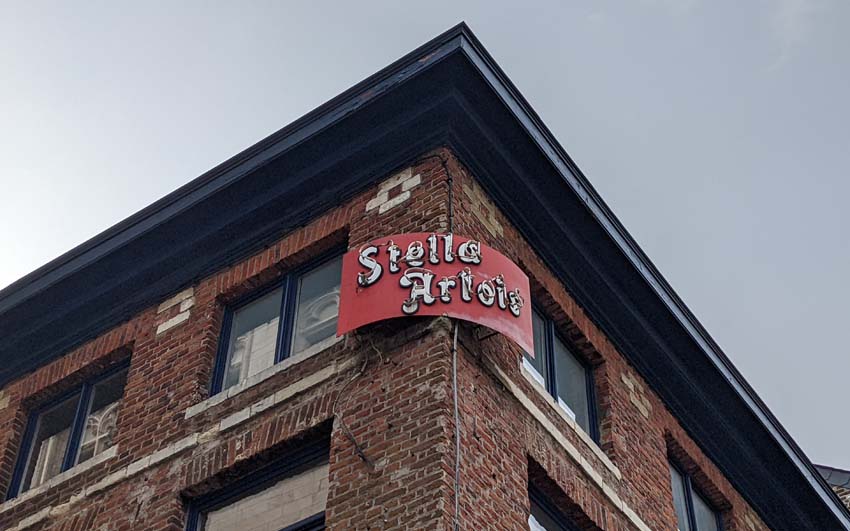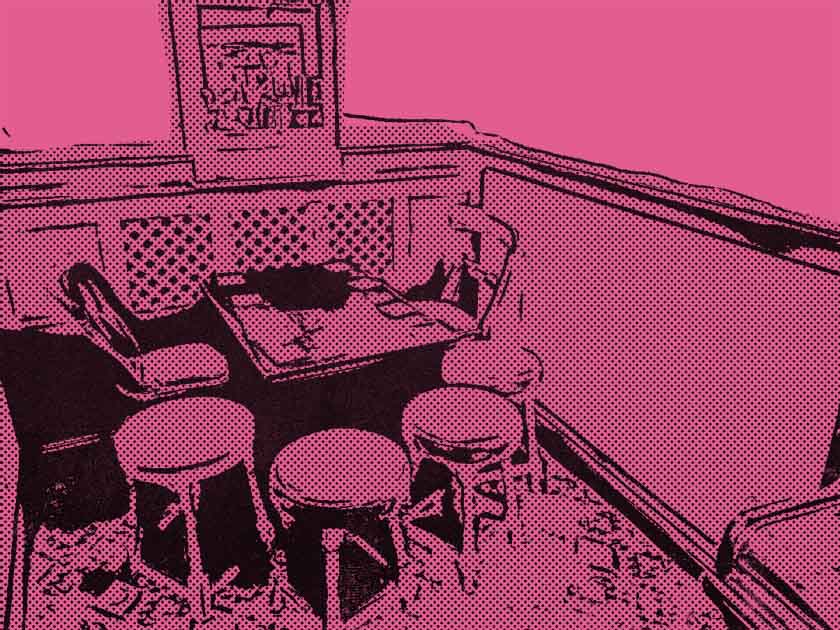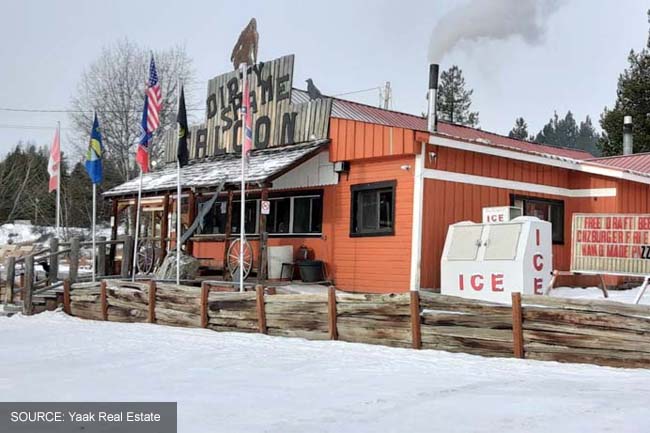Visit the Boak and Bailey's Beer Blog site
Here’s our pick of the best reading about beer and pubs from the past week including old breweries, writer’s pubs, and at least one machine gun.
First, a couple of bits of news that grabbed our attention:
- The Crooked House, the pub that was burned down in suspicious circumstances, is to be rebuilt by order of South Staffordshire Council. Here’s the news story from the BBC and there’s detailed commentary by Laura Hadland on her website at the bottom of a long page we bet she now wishes she’d structured in reverse order.
- A slew of new flagship pubs and taprooms have opened or been announced which strikes us as interesting in the wider gloomy context around hospitality: the Craft Beer Co’s new vintage beer pub, a St Austell and Harbour partnership in Cornwall, and a big Siren place in Reading. All via the indispensable Beer Today.
 At Beervana Jeff Alworth digs into a thorny question: how old really are these breweries that claim to be old? And from where do they get these fantastic founding dates?
At Beervana Jeff Alworth digs into a thorny question: how old really are these breweries that claim to be old? And from where do they get these fantastic founding dates?
According to its own history, Weihenstephan started life as a monastery, going back to the 8th century. A nearby farm produced hops, so the brewery believes the monks were making beer there, but they don’t mark their start date until 1040, when the abbot received a license to brew on the grounds. Over the next four centuries, the monastery burned down four times and was depopulated by three plagues, and hit by armies and at least one earthquake. Still, the monks rebuilt. While the history through this period is pretty sketchy, I don’t have any problem calling this legit continuity… However, here the historical record fragments for the next 400ish years and we skip to 1803, when the monastery was secularized. Did the monks continue to brew consistently that whole time?
 There’s a rather soul-bearing piece by Adrian Tierney-Jones on Substack about loneliness and the pub:
There’s a rather soul-bearing piece by Adrian Tierney-Jones on Substack about loneliness and the pub:
There are certainly times when I have been lonely, a state of mind desperately endless it seemed, alone in a flat that once held someone else’s voice and still contained some of her items, the lack of promise petering out and the slowness of the tick-tock of the clock stifling — anxious times as I thought then, when I thought I wanted to sleep for a long time, even though not long afterwards I realised this feeling was an indulgence… Now though, if I feel I am lonely what am I really asking myself and how do I deal with it? Maybe it is a case that the loneliness I feel can be assisted, as well as resisted, by the imagination and the memories of friends, past lovers, family members and that small island of delicious and decadent solitude I experience when in a crowd, sitting in a pub that is slowly being filled with people for instance. They bring with them their lives, their voices and their happiness…
 Katie Mather has been thinking about what might constitute a “writer’s pub”:
Katie Mather has been thinking about what might constitute a “writer’s pub”:
I’ve been trying to plan a short pubs-and-pushbikes break for myself over the summer where I can also get a little reading and scribbling done, and honestly, it’s become a fixation. No matter where I look I can never be sure what I want. Comfy seats? Not old enough. Rural and quaint? Too isolated. What am I looking for? Does the ideal writers’ pub actually exist? I’ve been zooming in and out of Google Maps all week trying to find a place that strikes the balances I require—most of which are incredibly hypocritical.
 SOURCE: The Beer Chaser/Yaak Real Estate.You know when you discover a website that’s apparently been around for years and you’re not sure how you missed it? The Beer Chaser is written by Don Williams, a retiree and compulsive ticker of bars and pubs across America. He has a particular interest in dive bars and one of his favourites is The Dirty Shame Saloon in Yaak, Montana, which sounds very… American:
SOURCE: The Beer Chaser/Yaak Real Estate.You know when you discover a website that’s apparently been around for years and you’re not sure how you missed it? The Beer Chaser is written by Don Williams, a retiree and compulsive ticker of bars and pubs across America. He has a particular interest in dive bars and one of his favourites is The Dirty Shame Saloon in Yaak, Montana, which sounds very… American:
Joan Melcher’s two books on Montana Watering Holes [suggest] there are at least three and possibly four incredible stories strictly on how the Shame was originally named… One involves fighter Joe Lewis and a second relates the saga of seven dead cows – shot by a guy named Jimmy who left them on the road in front of the bar. Don’t forget the other about a mother-in-law of one of the original owners who would sit in the corner of the bar and admonish him “What a ‘dirty shame’ it was that you bought this bar.”
There are a few things in the post that made us say “Oh dear” and “Yikes”, including a weird reference to someone as “a female”. But as a portrait of a place, and a people, and a pub that is not our world it’s fascinating.
 Stephen Liddell has been putting together some historic pub crawls which has led him to investigate the story of Newcastle pub landlord William Campbell, “the heaviest man in the world”:
Stephen Liddell has been putting together some historic pub crawls which has led him to investigate the story of Newcastle pub landlord William Campbell, “the heaviest man in the world”:
Born in Glasgow in 1856, Campbell was one of seven children in a family who were all of average proportions, but his parents will have realised they had a whopper on their hands when he’d reached four stone at the age of nine months… Inspired by a freak show that visited Glasgow, Campbell decided to exhibit his vast body for money. He billed himself as ‘The Biggest Man In Britain’, ‘Her Majesty’s Largest Subject’ or ‘The Heaviest Man In The World’, depending on how the fancy took him… The Duke of Wellington public house on High Bridge in Newcastle was owned by the brewers Bartleman & Crighton and had been raided by the police for illegal gambling, coming within a whisker of losing its licence. The brewery decided to change the tone of their business by hiring a celebrity to run the pub, and celebrities didn’t come any bigger than William Campbell.
 As you’ll know if you’ve been following us for a while ‘pub grub’, pub snacks, and the rise of the gastropub are favourite subjects of ours. Ron Pattinson is currently mining 1970s editions of The Brewers’ Guardian for nuggets and has shared a few posts on related subjects this week, including a survey about pub food from 1970:
As you’ll know if you’ve been following us for a while ‘pub grub’, pub snacks, and the rise of the gastropub are favourite subjects of ours. Ron Pattinson is currently mining 1970s editions of The Brewers’ Guardian for nuggets and has shared a few posts on related subjects this week, including a survey about pub food from 1970:
“Apart from the obvious things, like bad hygiene, I think what I dislike most is that one can never really tell how long the food has been standing in the warming cabinet. It’s easy enough to spot a curled up sandwich or a piece of mouldy cheese but if you fancy shepherd’s pie or sausages I am put off by the thought that they may have been re-heated from the morning session. Perhaps I am too nervous.”
This also reminded us of a joke in the 1940 Ealing comedy Saloon Bar, in which a pub landlord asks a barmaid since when the sandwiches have been on sale. “Last month,” she replies, “but they’ve been under glass you know.” He drops one on the floor, picks it up, blows off the dust and puts it back. “Well, see that they go tonight.”
Finally, from social media…
For more good reading check out Stan Hieronymus’s round-up from Monday and Alan McLeod’s from Thursday.
News, nuggets and longreads 2 March 2024: Because of the Cats originally posted at Boak & Bailey's Beer Blog
More...
At Beervana Jeff Alworth digs into a thorny question: how old really are these breweries that claim to be old? And from where do they get these fantastic founding dates?
There’s a rather soul-bearing piece by Adrian Tierney-Jones on Substack about loneliness and the pub:
Katie Mather has been thinking about what might constitute a “writer’s pub”:
SOURCE: The Beer Chaser/Yaak Real Estate.You know when you discover a website that’s apparently been around for years and you’re not sure how you missed it? The Beer Chaser is written by Don Williams, a retiree and compulsive ticker of bars and pubs across America. He has a particular interest in dive bars and one of his favourites is The Dirty Shame Saloon in Yaak, Montana, which sounds very… American:
Stephen Liddell has been putting together some historic pub crawls which has led him to investigate the story of Newcastle pub landlord William Campbell, “the heaviest man in the world”:
As you’ll know if you’ve been following us for a while ‘pub grub’, pub snacks, and the rise of the gastropub are favourite subjects of ours. Ron Pattinson is currently mining 1970s editions of The Brewers’ Guardian for nuggets and has shared a few posts on related subjects this week, including a survey about pub food from 1970:




 Reply With Quote
Reply With Quote